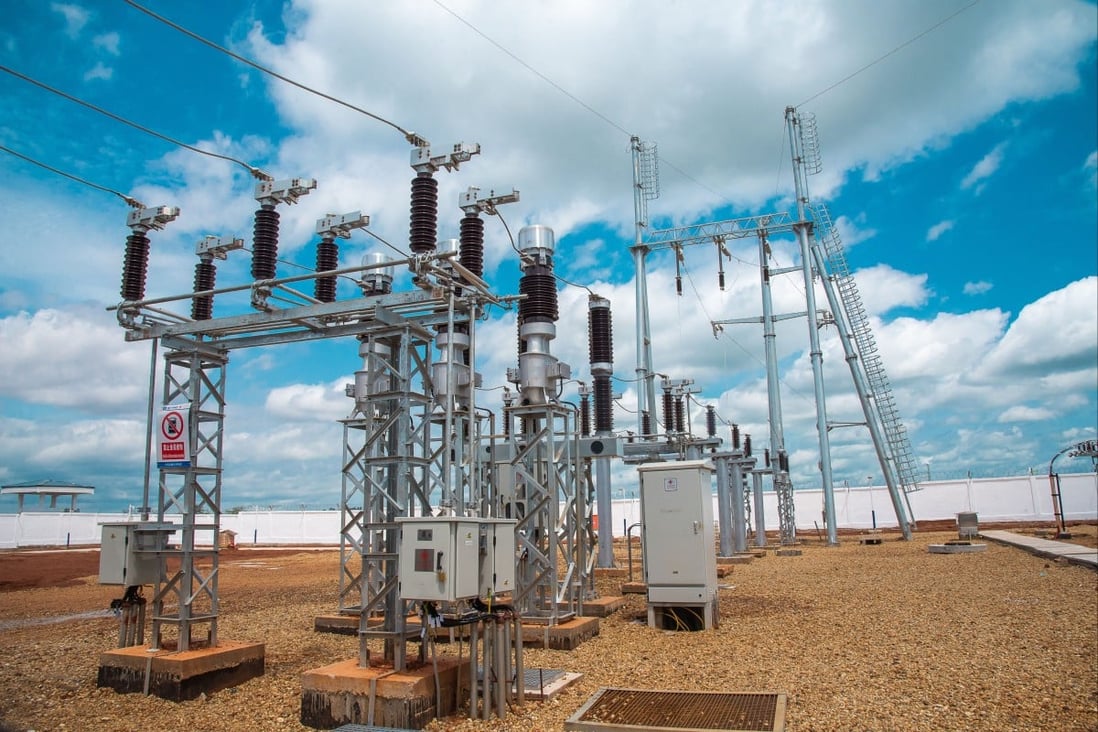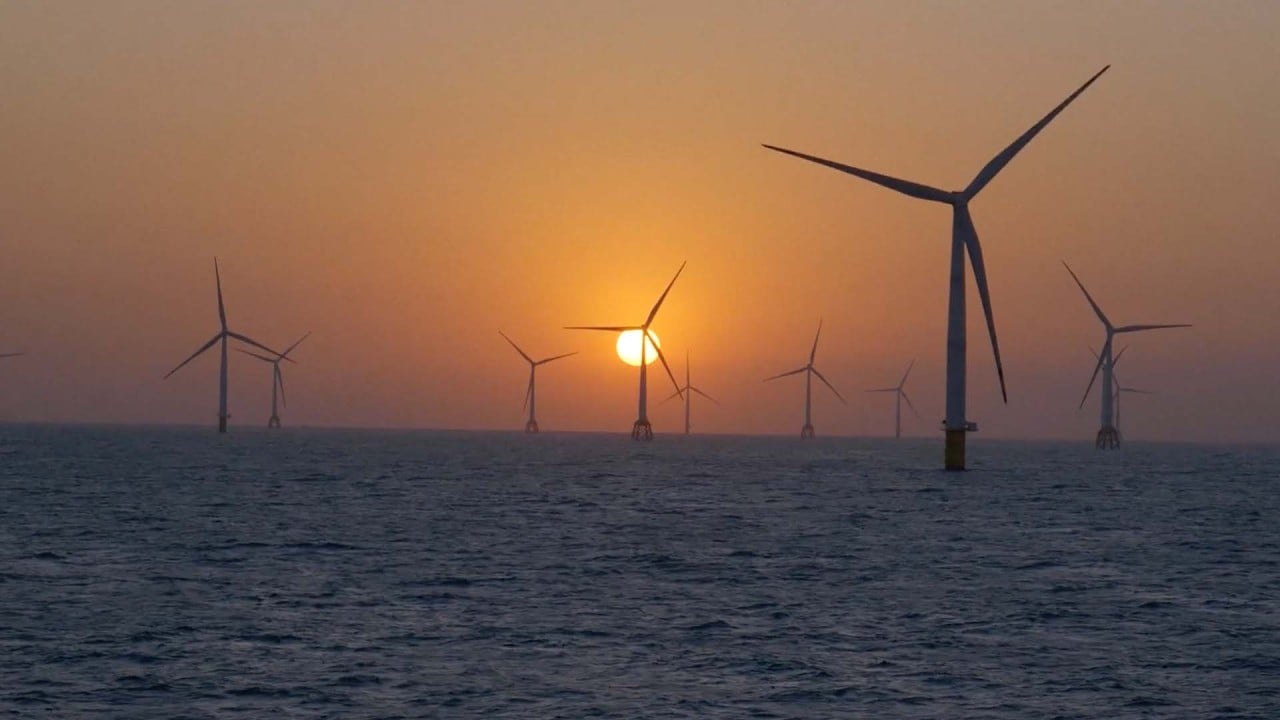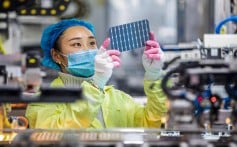China pledged last month to pursue ‘cooperation’ with 19 African nations on climate change and green energy development
The green potential of China’s pledge will depend on the willingness of local leaders to focus on sustainable outcomes, analyst says
Ralph Jenningsand Jevans Nyabiage
Published: 6 Nov, 2022

Transmission equipment at Sakai solar power plant in Bimbo, Central African Republic. Photo: Xinhua
In a small town 9km (5.6 miles) west of Bangui, the capital of the Central African Republic, a Chinese-funded solar plant is powering factories, schools and households.
Spanning 160,000 square metres (1.7 million sq ft) with more than 30,000 solar panels, the 15 megawatt operation in Bimbo meets about 30 per cent of the capital’s power needs.
Built by China Energy Engineering Group Tianjin Electric Power Construction, the solar plant, which was finished in June, is one of a slew of new green energy projects being developed in Africa with Chinese expertise.
Beijing recently pledged to help 19 African nations combat the effects of climate change, such as floods and drought triggered by a warming planet. Shifting away from fossil fuel energy will be a key plank of China’s help.
Is China’s pledge to swap coal plants for renewables abroad just hot air?
22 Oct 2022

The rush of green investment will do a power of good for the largely impoverished continent, which is on the front lines of climate change. China, meanwhile, will have its image polished overseas.
But while most of the development help is likely to be on renewable energy projects and climate mitigation, some African governments may prefer China to help exploit mineral or fossil fuel deposits, analysts say – potentially undermining green pledges.
Foreign ministry spokeswoman Mao Ning said last month China will pursue “cooperation” with the 19 African nations on climate change and green energy development.
“China not only helps African countries respond to climate change with every sincerity, but has also lived up to its commitments on global climate response,” Mao said.
China has already committed billions of US dollars in financial aid to Africa over the past two decades and says it has built more than 100 clean energy and sustainable development projects on the continent.
I expect China to invest in energy infrastructure and provide financing as a means of aid Liang Yan
Analysts say this new pledge is likely to come with loans on favourable terms to build renewable-energy plants or buy Chinese solar-power equipment.
“I expect China to invest in energy infrastructure and provide financing as a means of aid,” said Liang Yan, professor of economics at Willamette University in the United States. China is also likely to extend technological expertise too, she said.
This direction would fit with the Belt and Road Initiative, Liang said, referring to a US$1 trillion, nine-year-old scheme that has built infrastructure across the world to enhance trade links with China.
The diverse range of climates across Africa’s vast continent, which range from arid deserts to rainforests and glaciers, has warmed more than the global average since the pre-industrial period between 1850 and 1900, according to the United Nations’ World Meteorological Organization.
Sea levels along Africa’s coastlines are also rising faster than most other countries, it said, which is exacerbating the risk of floods and erosion.
China installs record number of solar panels on rooftops in race for carbon neutrality
Over the past 18 months, Ethiopia, Kenya and Somalia have been struggling through a drought due in part to temperatures linked to climate change. The extreme weather has killed crops and cattle while threatening to spread disease and cause widespread hunger, according to global charity Oxfam International.
China is well positioned to help mitigate the impacts of climate change because it has been phasing out coal at home in favour of renewable energy, said Barry Sautman, professor emeritus in the social science division at the Hong Kong University of Science and Technology.
The country’s carbon “intensity” – which measures the weight emitted per unit of energy consumed – dropped 48.4 per cent from 2005-20, exceeding an official target, according to a 2021 white paper from the State Council Information Office.
While China is making progress in transitioning away from fossil fuels, there is still a long way to go, and new coal-fired plants continue to be built amid concern about energy security in the country.
As a development partner overseas, however, China’s domination of the global solar supply chain and unparalleled spending on renewable energy give it an edge.
As China’s new-energy push accelerates, can it be a stable economic engine?
19 Sep 2022

China Exim Bank has already funded construction of a 15-megawatt solar power plant in Garissa, a semi-arid region of northeastern Kenya. China Jiangxi Corporation for International Economic and Technical Co-operation built the US$135.7 million plant, which began running in 2019.
It provides power for more than 380,000 people and remains one of the largest photovoltaic electricity stations in East Africa.
Chinese leaders are likely to approach climate through the Forum on China-Africa Cooperation (FOCAC), a senior-level dialogue platform that has helped launch numerous projects over the past 22 years, Jili said. The forum aims to advance the use of solar, hydropower and renewable energy in Africa.
During last year’s FOCAC in Senegal, China promised to increase investment in renewables, as well as energy-saving technologies and low-carbon industries. China has also vowed to stop building coal-fired power projects abroad.
To avoid defaults on any loans linked to green energy projects, China would probably cut interest rates or allow delayed repayments, Jili said.

01:50
China scales back emissions target with half of new electricity use to come from renewables by 2025
“This willingness to renegotiate terms relates to its insistence on maintaining a benevolent diplomatic image, which is precisely produced to contrast itself against other Western development partners,” he said.
But most of these projects come with a big price tag and some analysts say nations risk being saddled with unsustainable debt. Western officials have warned that some of China’s lending for infrastructure has put smaller countries in difficult positions where they cannot afford to repay their loans – so-called debt traps, which Beijing rejects vehemently.
Zambia became Africa’s first pandemic-era sovereign defaulter in 2020. It stopped work on several Chinese-funded infrastructure projects and cancelled undisbursed loans. In early September, China and other lenders gave debt relief assurances to the southern African nation, which helped unlock a US$1.3 billion bailout from the International Monetary Fund.
Uganda owed China US$200 million for its only international airport as of 2021, and Kenya hinted last week it will ask China to change the terms of its US$4.7 billion loan for a railway.
“China is aware of debt concerns in the region, while at the same time massive market opportunities await through rising energy needs paired with untapped solar and wind resources in Africa,” said Yingzhi Sarah Tang, a research fellow at the Green Finance & Development Centre at Fudan University.
China’s solar exports to Europe a bright spot amid dimming trade outlook
5 Oct 2022

“China aims to establish itself as a green leader and promote climate governance not only through financing and technology, but also through diplomatic relations.”
Chinese leaders are looking for political ties with “a significant number of countries that can function as allies in multilateral institutions like the UN but also have access to the key minerals that are going to form the trajectory of tech”, Jili said.
Some African governments might call on China to help them develop mineral reserves or even deposits of fossil fuels, rather than renewable energy, analysts said.
Two Chinese banks were financing four coal-fired power plants under construction in South Africa and Zimbabwe, despite China’s climate pledge to shun coal projects.
Kenya as a producer of coal would want to make use of its deposits, Sautman said.
Elsewhere, civil society groups in Uganda have criticised a Uganda-Tanzania oil pipeline for possible environmental damage and the displacement of households.
“For relatively poor countries, it’s always tempting to use the resources they have on hand rather than alternative sources of energy,” Sautman said.
Christoph Nedopil Wang, director of the Shanghai-based Green Finance & Development Centre, said the potential impact of China’s development pledge will depend on the willingness of local leaders to focus on sustainable outcomes.
Chinese President Xi Jinping told a belt and road forum in November last year that high-quality, “small and beautiful” projects should be a priority in overseas cooperation. He said those projects are sustainable and improve people’s livelihoods.
“Small and beautiful” is part of China’s shift from mega infrastructure projects to smaller but profitable ventures under its Belt and Road Initiative. Investors will also take on less risk.

01:31
World’s largest hydro-solar farm floats atop reservoir in Thailand
Despite the potential of clean energy projects, particularly through distributed solar and other localised solutions, China so far is still engaging in “large-scale fossil energy developments across the region”, Wang said.
In the first half of 2022, gas projects were the main driver of China’s energy financing and investment across Africa, Wang said.
Wei Shen, a research fellow at the Institute of Development Studies in Britain, said data indicated Chinese state-owned enterprises and development finance institutions were pulling back from financing overseas coal-fired power plants after Beijing pledged to do so in October last year.
“China certainly hopes to promote its world leading renewable energy capacities worldwide, as it did once on conventional energy projects,” Shen said.

Ralph Jenning joined the Politcal Economy desk as a Senior Reporter in August 2022 having worked as a freelancer since 2011. Ralph previously worked for Thomson Reuters in Taipei and for local newspapers in California. He graduated from University of California, Berkeley with a bachelor’s degree in mass communication.
Jevans Nyabiage
Kenyan journalist Jevans Nyabiage is South China Morning Post's first Africa correspondent. Based in Nairobi, Jevans keeps an eye on China-Africa relations and also Chinese investments, ranging from infrastructure to energy and metal, on the continent.
No comments:
Post a Comment